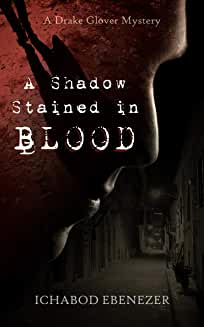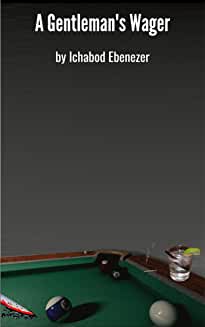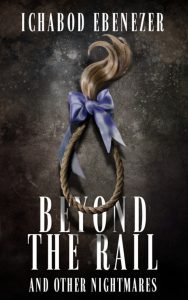This month’s story is The Third Age, by Ichabod Ebenezer. To download a printable .pdf file of the story, please click here.

The Third Age
Ichabod Ebenezer
Jacob stood on an old ladder in the middle of his field, tending his scarecrow. The shirt was perhaps a little threadbare, and a patch of lichen was spreading across one shoulder, but the face was in great condition. It still looked terrifying to him.
So, why wasn’t it working anymore?
He turned on his precarious perch to survey his field and the crows that sat amongst his crop, cawing at each other like gossiping washer women. Many of his cabbages lay ruined, half eaten. The buckwheat planted between rows was lush with pink flowers, but should be further along by now.
The crows took to wing, complaining angrily. Jacob’s neighbor, Christian, approached, a sullen look clouding his expression, a bushel basket under his arm.
Jacob raised a hand in greeting. “Brother Christian. What ho?”
Christian returned the wave. “I saw you in your field and thought I’d get your opinion.”
He raised the basket to show him its contents. Potatoes, Christian’s main crop, both reds and cream, rolled around the bottom of the basket.
“Your winter crop?” Jacob asked unnecessarily. He climbed down the ladder to inspect them more closely.
“Aye. Smaller than last year, wouldn’t you say?”
“Looks to be. What part of the field did you sample from?” Jacob took one of the potatoes in hand and squeezed. Solid, decent skin, but as Christian said, smaller than usual.
“Just the first quarter of the first row so far. And half of that I had to throw in the compost. Full of beetle larvae.”
That got Jacob’s attention. They hadn’t had potato beetles in Caan since he was a boy.
“You planted beans alongside them?” A moment later, he realized this was the winter crop and beans wouldn’t grow. “Rosemary? Sage?”
“I’m not a fool, Jacob. I did everything Mother Ruth said.”
Jacob placed the potato back with the others. “Well, the center of your field will probably have healthier plants.”
“Aye, it will, but that doesn’t change matters. Look around you, Jacob. I’ve spoken with the others too. James’s spring calf was stillborn, and Thomas says his beets are slow to emerge. The talismans and charms aren’t working like they used to.” Christian looked around and stepped closer, as if someone may overhear them. As if the crows would later tell of their conversation.
“Do you think we’ve offended… him?” Christian surreptitiously pointed upward, instantly returning his hand to the basket.
Jacob turned his head toward the heavens. Not a patch of blue pierced the clouds that stretched from horizon to horizon, but a bright circle shone through the midmorning cover. From there, he turned his gaze to the scarecrow, silently watching them. He didn’t want to admit that just minutes ago he’d been thinking the same thing.
“I don’t know, Brother Christian. I think we should seek out Mother Ruth.”
Christian stared off toward his neighboring field and nodded. “Aye.”
Mother Ruth lived a bit away from the village, in a little wooden house her sons had built for her. Her children had since had children of their own and all passed on to the Lord’s embrace, so she lived on her own. The villagers did their best to take care of her, but most of the time she politely refused, preferring to do what she could herself.
She maintained a small garden, and every day she milked her cow, Ursa, who must have been nearly as old as she was. Mother Ruth collected the berries that grew on nearby trees, pulled dandelions from between her rows of tomatoes and beets, and turned them into a tea she always shared with visitors. According to her, she didn’t need much more.
Still, the men of her village patched her roof when the rains came, and made a stool for the garden when her knees became too painful.
All this was in exchange for her hundred plus years of wisdom and the occasional folk charm, both of which the villagers needed today.
Brother Mosel and his wife Talia led the group of farmers, including Jacob, Christian, and Thomas, up the winding forest path to Mother Ruth’s home. They found her on her porch, gumming leaves from her pepper tree and stroking Uriel, the old calico asleep in her lap.
“’Bout time you all got out here,” she said. “Ain’t none of you been curious about the portents lately?”
Mosel glanced back at the others before responding. “That’s why we’re here, Mother Ruth. Our crops are beset despite the charms and practices, and there have been two stillborns so far this spring.”
She nodded and leaned over to spit out a mass of muddled leaves. “Just as I thought. The phoenix’s flight has been all turned around, and last week I saw a beaver just standing ‘neath a tree like he didn’t know what to do with it. Little Thomas, be a dear and fetch my casting bones for me? They’re on the high shelf in the kitchen, and I just don’t seem to have the reach I used to.”
At six feet three, Thomas was hardly little anymore, but Mother Ruth still saw him as the energetic child she’d helped to birth. He hurried inside despite that and quickly returned with the wooden box of old bones.
Jacob craned his neck to see better. The casting of bones was her way of consulting with mysterious forces, the spirits of the wild, her own ancestors, perhaps even the Lord’s own angels with their knowledge of future events. Depending on the teller of the story, the bones inside that box were either taken from a saint, a cockatrice, or a gorgon. His father always scoffed at such tales, however, saying the bones were just the knuckles of Mother Ruth’s old bull, Grendel.
Mother Ruth opened the box, and the crowd moved in closer, blocking Jacob’s view. A collective gasp went through the group. Frustrated, Jacob elbowed his way between two of the other villagers until Mother Ruth’s time-worn hands came into view.
Sand, or what looked like sand, sifted through her fingers. Three small bones remained in the box, covered in more of the bone white sand.
A dread silence fell over the crowd as Mother Ruth rubbed her thumb over the pads of her fingers and the last few grains fell into the box below.
“What does this mean?” Talia asked, her whispered, desperate plea feeling dangerously loud on the otherwise silent porch. Mosel put his arm around her shoulder and pulled her tight.
Mother Ruth picked through the sand, removing the few remaining bones and letting them clatter across her open palm.
“It means, the problem is bigger than just our little village. It means,” she looked up to take in all the faces looking back at her, “that I don’t have the magics to find our solution.”
Thomas pulled the hat from his head and wrung it between his beefy hands. “What are we to do?”
The cat in Ruth’s lap reached a paw out toward the bones, and Ruth snapped her fingers over them. She sat back in her rocker, scruffing the fur of Uriel’s neck while rolling the bones in her other fist.
“Mother Ruth?” another farmer prompted, but she would not be hurried in her rumination.
“Summer is coming,” she said. “The robins are laying their blue speckled eggs and the geese are winging their way north. Uriel is growing fat off the hornworms she pulls off my tomatoes.”
For a while she said nothing more, just continued rocking and stroking her cat, and grinding the bones in her fist.
“Moisha dear, when is the next full moon?” she asked.
Brother Mosel blushed visibly beneath his full beard, now more gray than black, to hear his childhood nickname, but he responded quickly. “Four nights hence, Mother Ruth.”
“Yacki,” she said next, and Jacob felt his own face flush. “How are your knees?”
“Strong as ever, Mother Ruth,” he said, fibbing only a little.
“Thomas, go fetch my necklace from the coat rack. There’s a whole tangle of them, but this will be the one with the antlers. You can’t miss it. Come sit by me, Yacki.”
The crowd parted, allowing Jacob access. Mother Ruth didn’t have another chair on the porch, but the wooden slats were meticulously clean, so he sat on the floor beside her rocker, looking up to await her instructions. The cat on her lap scowled at him through her purring, then slowly closed her eyes to show her indifference.
“The king of the forest, the Great Stag, rules the wilds around our home. All creatures, natural and magical bow to his will, and he protects them. As he protects us. Yacki, you will need to seek him out and present our concerns to him.”
Fear shot up Jacob’s spine and he straightened. “The Great Stag?”
Thomas returned with Mother Ruth’s necklace, a simple twine loop with beads of clay and stone. At its center, a tiny skull of perhaps a baby cat or dog, but with a small pair of antlers protruding from the top. Mother Ruth took the necklace, wrapping it around her fist with the bones in it. She held it out toward Jacob with the skull dangling beneath.
He gazed into the eye sockets, and the breath caught in his chest. For just a moment, it felt like a living thing was gazing back at him.
“Hush now, Yacki. Don’t you fret. If you come bearing my necklace, the Great Stag will recognize you. And if you are polite, he will answer your questions. You know how to be polite, don’t you?”
“Yes, ma’am,” he said.
“Good. Now take it and make your preparations.”
Jacob let the necklace slide into his outstretched hands. He didn’t want to touch the skull, so he let it dangle just as she had.
“But, Mother Ruth, how am I to find the Great Stag?”
She patted his head, much the way she did with the cat. “It’s true, the Stag has the run of the forest, and he can fly quick as moonlight to any part of his domain. Normally you don’t find him. He finds you.” She leaned in close, and Uriel leapt from her lap, stretching her long spine and digging her claws into the porch boards.
“Except one time each year. On the last full moon of spring, just at moonrise, he can always be found at the top of Hawthorne Ridge, surveying his land.”
She sat back and began rocking again. “He’ll be there. Just be sure you are there too.”

Hawthorne Ridge was nearly a full day’s journey from Caan, so Jacob set out early on the third day to be sure of arriving by moonrise. Brother Mosel assured him that this would take place mere minutes after sunset, so before the sun rose, he began his journey. His chickens would be unhappy that he didn’t let them out for the day, but he would not be there to guard them, and foxes had been spotted close to the village lately where foxes never dared before.
His wife had packed a small meal for him, two boiled eggs and a chicken leg, as well as a turnip broth from the last of their winter stock. This would have to be enough to sustain him on his journey there and back.
As the sun rose high and his hunger struck, he opted for the soup, reasoning that he could refill the water skin from a stream on the way back and have the eggs then.
At sunset, as he waited at the edge of the tree line within view of the protruding rock that was the Great Stag’s platform, he unwrapped the chicken leg, but found he was too nervous to eat and returned it to its waxed paper.
Jacob waited breathlessly, startling at every bird sound and every shift in the wind. He watched the eastern horizon, the growing mist, and the bare patch that marked the village of Caan, so far away. It may have been mere minutes, but time passed like January molasses while he waited for the moon.
Then, just as a silvery sliver of light appeared on the horizon, the sound of hooves on stone caused him to whip his head around in the opposite direction. The Great Stag stood eight feet tall at the shoulder and had a massive rack of perhaps twenty points. His hide glowed in the burgeoning moonlight. His broad flank was exposed, proud. A tuft of brown fur decorated his neck and chest like a lion’s mane.
There was no question of hunting such a magnificent creature. His presence filled Jacob with awe and fear. The idea of approaching this unique beast to bother him with the questions of an insignificant village felt almost sacrilegious.
Jacob swallowed hard. Even with Mother Ruth’s necklace clutched tightly in his shaking hand, he wanted nothing more than to run and hope the Great Stag never noticed him.
Instead, he forced himself to breathe and took one step out of the woods. Once he had, there was no other choice but to continue. Despite the fact the Great Stag never looked away from the view of his kingdom, his ear shifted. He had noticed Jacob.
Jacob had to consciously clench down on his bladder before it leaked. He wet his lips and continued forward in a manner he hoped looked confident despite his fluttering heart.
The Stag finally turned, rotating his full body to face Jacob. His shiny black eyes penetrated Jacob’s soul without expression to give away his intentions. Neither benevolence, nor outrage. He could lower his antlers at any moment and charge, and that would be Jacob’s end.
Jacob threw himself to the ground without looking up, holding the necklace out before him.
“Oh, Great Stag, please pardon my presence. I come from the village of Caan to seek your wisdom.”
Jacob kept his gaze on the dirt before him, praying that his submissive pose would be interpreted as polite to one such as the Great Stag, hopeful that the talisman he bore would truly curry favor.
“Speak.”
The voice came into Jacob’s head, clear and deep, drowning out all his own thoughts. The ground beneath his limbs shook with the voice in his head. Something he knew was impossible.
“Great Stag, our talismans are failing. Our crops no longer produce the bounty of previous years, and pests invade our land. Even Mother Ruth, who guides us in times of trouble, cannot help because her osteomancy bones have crumbled to dust.”
The Stag turned away again, gazing off the cliff and over the forest spun silver in the radiant darkness. “It is true. Magic is fading from this realm. On the summer Solstice, it will be gone entirely.”
“What can be done about it?”
“Done?” The single word held an accusatory tone, as if the question were impertinent, even insulting.
“Yes, oh Great Stag,” Jacob said, bowing his head until his forehead touched the ground. “What can we do to restore the magic?”
The Stag was silent again. He slowly turned his head from one horizon to the other. The stars slowly turned overhead.
Jacob looked up to be sure the stag was still there.
Unnoticed by Jacob, forest animals had begun to gather. Rabbits and squirrels sat on their haunches. Owls and raccoons perched in the trees. Predatory eyes glowed beneath the cover of the trees.
Jacob swallowed hard. He had a mad thought that each of these creatures were supplicants like himself, each with a question for the Great Stag, patiently waiting their turn. Jacob nearly laughed, but fear kept it down. His laughter might break the spell that held these creatures, many of them natural enemies, peacefully gathered.
“There have been two ages of humanity,” said the Stag’s booming voice in Jacob’s head. “In the first, you were just as any other animal, taking your place in the vast web of existence. You hunted, you killed, you ate, you bred. And in return, you were hunted.”
A thick growl came from the woods behind Jacob at this last statement. A pack of wolves had taken up position behind him, but by the time he looked, they were all lolling tongues and smiling expressions.
The Stag continued. “Then, you were raised above the others. You were given tools and inspiration. Each generation built upon the discoveries of previous generations. This was the second age, and to cement your place, some among you were taught the ways of magic. Talismans would keep your crops be inviolate. Runed bones would help you find answers you couldn’t otherwise get. Healing draughts could get a productive worker back on their feet rather than languishing in bed or dying outright. This was done to give you a buffer of protection as you came out of your infancy.”
Movement in the forest below drew Jacob’s attention away from the Stag’s revelations. A large swath of trees shook all at once in a storm of cracking wood and flying needles, as if some great wind had settled upon that section of the forest, leaving the neighboring trees untouched.
Jacob’s heart froze as moments later, the reason for this movement became apparent as the hill upon which they stood turned, showing its rocky face. Those trees had grown upon the back of a sleeping troll who now stirred to listen to the Stag’s story.
With his attention now on the forest below, more magical creatures too large to join them on Hawthorne Peak revealed themselves in the landscape. The slithering spine of a hillside was in fact a massive dragon. A herd of water horses stamped at the edge of a lake below. A flock of what he’d taken for bats wheeling about before the moon dove a little closer, displaying the feminine upper bodies of harpies.
Every creature of myth and commonality was represented in this gathering, and all bowed to the Great Stag.
“There comes a time when all birds are pushed out of their nest, when kits and cubs can stay no longer in mother’s den. The time has come for mankind to enter its third age. You are established as the dominant species of this world, and you will either stand on your own, or prove yourselves unworthy of your placement.”
Jacob’s mind reeled with the implications. Their crops and homes would be unprotected, the heartiest among them would fall prey to sickness and injury, not merely in their village, but across the world.
“However, knowledge once learned, cannot be untaught. The only way to take magic from mankind is to remove it from the world. Those among us where magic is part of our very nature will die out if we remain.”
The Stag turned once again, to face Jacob. “Go now, while the moon remains within the sky. When it sets, so will end my protection, and the beasts of the forest can do with you as their instincts dictate. Return to your village and spread word far and wide. Prepare.”
Jacob stood on shaky legs, but could not leave just yet. There was one more thing he had to ask. “Great Stag, surely you don’t intend to die, just for us? There must be something we can do. Tell me, what can we do?”
The Stag pawed at the ground and once again turned. This time, not to the forest below, but to the sky above. “We will remain while a trace of magic exists. On the night of the solstice, a path will open. Those with magic in our souls may take this path. Those who remain will die. Now, go.”
Jacob glanced at the moon, his hourglass, now some distance above the horizon. If he were to make it to the safety of his village before the Stag’s protection wore off, he would need to run. And run he did.

Once again, the villagers gathered at Mother Ruth’s house.
When Jacob had finished his tale, Christian said, “But the horseshoes over our doors… Those will still work, right?”
“It appears not,” Jacob responded.
“But my scarecrow,” John said. “I need my scarecrow.”
Jacob sighed. “It will merely be decorative soon.”
Chaim raised his hand. “I still have some of Mother Ruth’s tonic left from this winter. Perhaps that will be fine?”
“Everyone, please. I wish you had all been there to ask your questions of the Great Stag. I can only tell you what he said. It isn’t like we are losing our ability to make magical things. There will be no more magic at all. There will be no magic anywhere.”
“But if my talismans don’t work anymore, what’s to keep the brownies from spoiling my cream?”
“Brownies are magical. They are either leaving with the Stag or dying.”
“Fairies are tricky creatures. What if they managed to—”
“The Great Stag is not so easily tricked. Nor is the Lord. Please. We will just have to learn to do without magic.”
“What’s to keep the deer out of my lettuce?” Thomas asked. “And don’t tell me they’re magical.”
Just because Jacob had spoken to the Stag, did that mean he was supposed to have all the answers?”
Mosel saved him. “Perhaps we could build a fence?”
And they did. The villagers got together and split enough logs to build a sturdy fence around each farmer’s field, too high for a deer to jump over.
What’s more, Mother Ruth announced that Uriel had gotten up to all sorts of nonsense with a roaming tom, and would soon have a litter as a result. Each family should take a kitten to chase off any rodents that tried to make a meal of their garden.
In the days leading up to the solstice, Jacob had the feeling of something left unfinished. It came out in a conversation with his neighbor Christian. What he wanted to do was be there when the Stag climbed Hawthorne Peak for the last time. To see him off the same way he would any young man of the village who decided to seek his fortune in the world outside.
He couldn’t let the Great Stag go without saying goodbye, as an act of respect and appreciation.
Word got around, and when Jacob was packed and ready for the hike on the morning of the solstice, he found the entire village ready to go right along with him. Even Mother Ruth was there, sitting in Thomas’s hay-filled wagon, the big man leading his old draft horse to pull it.
Jacob took Thomas aside. “You know there is no road up to Hawthorne Peak.”
Thomas shrugged. “She wants to see the Stag in person. I’ll drive as far as I can, then I’ll carry her the rest of the way.”
The villagers traveled all day, reaching the base of Hawthorne Ridge sometime after noon. Mother Ruth climbed up on Thomas’s back, and the villagers made their way up the trail in silence. The sun set as they neared the summit, and they made the rest of their journey by starlight.
At the summit, they encountered an odd green shimmer to the distant north. Jacob had heard tales of those who live in the far north, and the curtains of light that dance across the sky, painting pictures and retelling ancient battles. He’d never expected to see them himself.
The sun’s glow in the western sky was steadily replaced by green in the north as the stars slowly turned in the moonless sky.
The Stag was there too, not as if he’d arrived, but as if he’d always been there and just allowed himself to be seen. He watched the gathered people as if questioning their reason for being there.
This time, however, the people had no questions for him. Instead, they stood by, bearing witness.
The Stag stepped back, making way for others to approach the large, flat rock jutting out over the edge.
In the night sky, the shimmering green curtain danced ever closer, the light bright enough to read by.
Small, humanoid creatures emerged from the darkness of the trees. Brownies, pixies, goblins, and redcaps alike, walked toward the flat rock. A ribbon of green light unfurled from the shimmering curtain, its edge coming to rest just off the edge.
The pixies flitted across on ephemeral wings. The brownies and goblins tread on the ribbon like a solid bridge. With but three steps, they were a mile away. With three more, they were out of sight.
They were followed by all sorts of creatures, from shadows that walked upright, to trees with human faces. Forest cats with a myriad of constantly sweeping tails, and spirits that coalesced from the aether before the assembled humans.
Dragons whirled overhead, blotting out the stars and sweeping toward the north, disappearing in a bright green flash at the horizon. Entire hillsides below the peak shifted and raised enormous stony arms to climb upon the feeble bridge, and they too vanished.
The night wore on as creatures of myth and legend, as well as barely remembered story and deepest nightmare, strode up to the edge of the cliff and stepped off into the sky.
Then it was over. Only the Great Stag remained, regarding the humans who had gathered to witness the end of the second age.
Time passed between them, with no one saying a word, just the odd humming twinkle of the aurora bridge to fill the void.
Then, the Stag’s booming voice filled Jacob’s head, and he instantly knew the others heard it as well. “Ruth, you are known to us. You have practiced magic so long that it has become a part of you. It has kept you alive beyond the normal span of human existence. You have used those years, not just for the betterment of your village, but of the land. When I leave this world, that magic will go with me. You will not long survive its loss. I offer you this chance. Come with me, into the next world. I will make you young again, and eternally beautiful, and you may live out your days among like creatures.”
Mother Ruth tapped Thomas’s shoulder, and he helped her climb down, making sure she was steady on her feet. She walked forward, leaning heavily on her cane, and stopped halfway between humanity and the Stag.
She bowed to the Stag, and a gasp went through the villagers as the Stag bowed back.
“Nah,” Mother Ruth said. “I dipped my toes in your waters since I was a slip of a girl, but this is my world. I buried a husband and four children in these woods, and I’m ready to join them. I appreciate your offer, but I’ll be staying behind.”
The Stag bowed again. “As you wish.” With that, he stepped off the stone platform, and he, along with the bridge itself and the entire glow to the north, vanished.
Mother Ruth nodded and turned back toward them. Brother Thomas helped her climb into his arms, and the villagers began their slow decent of the mountain once more.
When they reached the base of the mountain, they gathered around the wagon as Thomas laid Mother Ruth’s body in the hay.
Some wept. The rest stood silently, respectfully. The woman who had been a large part of their lives for longer than anyone remembered, now looked so small. Sister Talia removed her shawl and draped it over Ruth’s lifeless form.
“What do we do now?” Brother Thomas asked, wiping a large hand across his wet face.
“Now, we begin the third age,” Brother Mosel said, now the oldest among them. Now the wisest.
© 2023 Ichabod Ebenezer. All rights reserved.

The ideas that led to The Third Age were many. First off, we had the month of June, and if I associated March with the equinox, I had to think of the solstice for June. That got me thinking of astronomical events, which led to portents and telling futures. Also, I had in mind some of the tropes of fantasy, such as the bleak, isolated farming village, the wise old woman who dabbles in hedge magic, the powerful and inscrutable beings of the forest, and I wanted to weave them into my story, but with a twist. So many stories start in the ordinary world and the characters discover magic along the way. I decided to go the other way around. Finally, I had a stray thought about the Sphynx’s riddle. “What walks on four legs in the morning, two legs in the afternoon, and three legs in the evening?” The answer being mankind, who crawls as a baby, walks upright in adulthood, and needs a cane in old age. And that’s where I got my title. With the loss of magic, mankind was entering its third age.
There you go. I hope you enjoy it.
-Ichabod

Ichabod Ebenezer is the genre-promiscuous author of ‘A Shadow Stained in Blood’ and the horror short story collection, ‘Beyond the Rail and Other Nightmares.’ He lives and writes in the Pacific Northwest with his family, a chameleon, and the ghosts of three cats. There is always a skeleton or two in his closet.


https://amzn.to/3KEYOzW

Social media links:
Website: https://theichabodebenezer.com
Twitter: https://twitter.com/IchabodEbenezer
Amazon Author Page: https://www.amazon.com/Ichabod-Ebenezer/e/B07TF7KPQS/

Click the banner above to learn more about Ichabod Ebenezer, or click HERE!
Coming Next Month:


